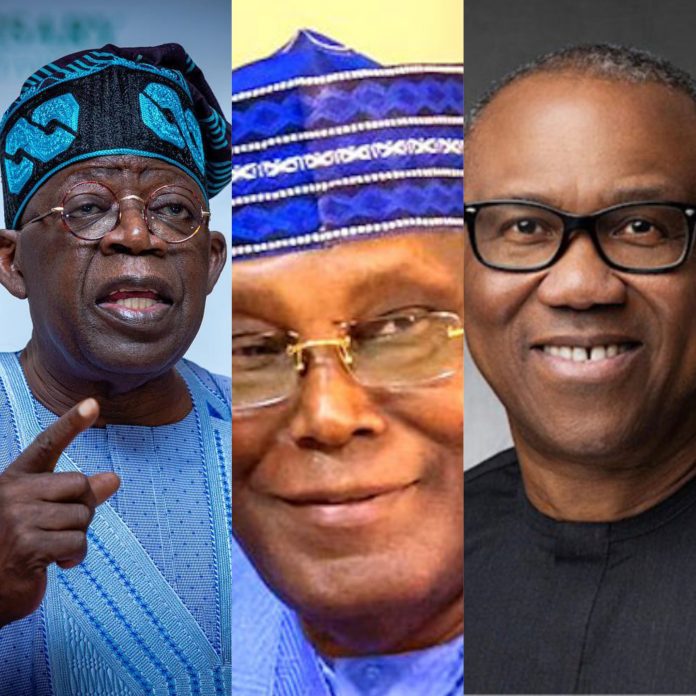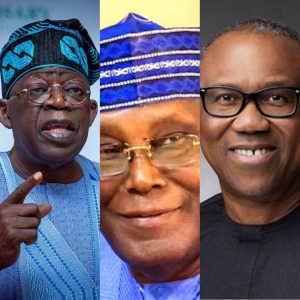Tinubu,Atiku,Obi
Saturday’s presidential election, as it is, from reasonable projections and analyses, promises to be the most intriguingly competitive contestation for power in the annals of Nigeria’s Fourth Republic. For the first time, we have a four-horse race. Interestingly, the four candidates are from the two regional blocks -North and South of Nigeria-and four geo-political zones, to wit: Southwest (Bola Tinubu, presidential candidate of the All Progressives Congress, APC), Southeast (Peter Obi, presidential candidate of the Labour Party, LP), Northeast (Atiku Abubakar, presidential candidate of the Peoples Democratic Party, PDP) and Northwest (Rabiu Kwankwaso, presidential candidate of the New Nigeria Peoples Party, NNPP). So, the north central and the south-south zones are consequentially not “locked down” since they have not produced strong contenders for the position, and therefore, the zones are open electoral pitches for poachers of votes that are the most essential factor to determine the direction that the pendulum of victory would swing.
The opening gambit supra is the simplest in the cohort of projections and analyses yet in the combustible build-up to the poll. Other outlooks have defied textbook prescriptions about how to permutate in the circumstances of some political givens, gravitations, endorsements, approbations, associations, aggregations and validations in the contexts of strategic politicking, pursuit of group interest and interests vested in focal presidential candidate who becomes the ultimate power centre consequent upon victory. In the corollary, the scenario and terrain have become so convoluted that projecting a winner with analytical exactitudes is somewhat far from achievable. Indeed, the political miasma has been evidently worsened by the characters that have been foisted on the polity by the political parties through their internal contradictions and transactional tempers that passed for primary elections. The decisions by the two dominant parties to foist on Nigerians Atiku Abubakar (PDP) and Bola Tinubu (APC) as faits accomplis would later galvanise momentum behind and around a third force in Peter Obi (LP). Then add the Rabiu Kwankwaso effects to the political mix with the potentialities of discounting the critical northern votes that the trio of Tinubu, Atiku (being the most affected) and Obi would have received sans his participation.
The broad consensus by Nigerians before the LP and NNPP threw up Obi and Kwankwaso was that both the PDP and the APC had thrown the vast majority of Nigerians who were not their card-carrying members into a confusion of sorts, having to choose, as Greek’s Odysseus did, between Scylla and Charybdis, when confronted with a choice between two monstrosities. Perhaps, had the APC produced another candidate apart from Bola Tinubu and the PDP, another candidate apart from Atiku Abubakar, the scenario would have been largely and significantly different. More specifically, let me play the devil’s advocate here: had Vice-president Yemi Osinbajo emerged as the APC presidential candidate from the southwest and Peter Obi emerged as PDP presidential candidate from the southeast in circumscription of the idea of southern presidency, even with Rabiu Kwankwaso in the arrangement, Nigerians would have been left to decide among extremely brilliant, energetic and relatively young Nigerian leaders with infectious élan, writ large gravitas and enviable pedigrees that robustly recommend them for employment by Nigerians. I believe that Nigerians, through their votes, would very likely look towards the South for their pick of a president.
But then, the alternative political arrangements that were coupled, post-hoc, accommodated only Obi and Kwankwaso, (explicably without Osinbajo), which is the reason they are on the ballot, producing some tectonic or seismic shifts in the nation’s political substructure and superstructure with consequential calculations and permutations suggesting too-close-to-call outcomes in the critical February 25 presidential poll. It is the reason the talks about run-off polls have been rife. And, beyond the consummation of these alternative political arrangements are the existential realities, factors, and considerations that circumscribe and profoundly define the four frontline presidential candidates. These existential realities, et al, verge largely on the strengths, weaknesses, opportunities, and threats inherent in their candidatures. Apart from the factor of old age that looms as a huge question mark on candidates Tinubu and Atiku, is the issue of entitlement to the presidency that is rooted in age-long desires by both leaders to be president. Whereas, Tinubu verbalized this entitlement mentality in Abeokuta in his now famous “Emi lo kan” (it is my turn to be president) outburst, which has been attacked by many dispassionate Nigerians who insist that the presidency cannot be about him or any single person, Atiku gave expression to his quiet entitlement by somewhat ensuring the non-crystallization of elite consensus in the PDP to micro-zone the presidential ticket to the southeast (even though Governor Nyesom Wike has been scapegoated for this) in order to provide necessary justification for grabbing the ticket even when there was a consensus that the presidency should rotate to the South of Nigeria in 2023.
And, whereas, Tinubu’s candidature is anchored on a political pedestal that is largely buffeted and, therefore, wobbling on account of the policies of the party that is sponsoring him, to wit: lingering fuel crisis and naira redesign debacle that have conspired to vex the spirits of Nigerians, both card carrying and non-card-carrying members alike, at the twilight of the APC administration and on the homestretch to the polls, Atiku Abubakar’s desperation to contest against the run of play is most brazenly and violently affronting the clear, strategic imperative of obligatory power rotation to the south, albeit this is moot. The Atiku Abubakar resolve is antithetical to the ennobling spirit of morality (although they say there is no morality in politics) that would have commended him for a warm eternal embrace by posterity. But with a heart that is obsessed with presidential power acquisition and an army of political associates nudging him to ignore that critical consideration just because they seek accommodation in post-election prebendal arrangements, Atiku Abubakar is in contestation for power hoisted on the clear premise of divisiveness as opposed to his claim of unification around which he constructed the leitmotif of his “unifier” identity. And, his proclamation creates a contradiction of sorts and greater crisis in terms of credibility as to how he would keep fidelity to official pronouncements peradventure he steps in the saddle.
Now, consider the factor of corruption. This is subjective, more so that none has been convicted in that regard, and therefore would not suffice to threaten the chances of all the candidates. Attempts by both the APC and PDP strategists to throw barbs at their respective candidates with a view to demarketing them amounted to blowing of hot air, perhaps, just for the sake of distraction. Instructively, Atiku, Tinubu (to some extent, because he gave full dose of side swipes to Atiku and Obi on some occasions), Obi and Kwankwaso were neither distracted nor did they jump into the fray of mudslinging and character assassination.
Therefore, as Nigerians file out to vote on Saturday, February 25, having been confronted by the mischief of having to choose between Scylla and Charybdis but which was cured by the emergence of Obi, Kwankwaso and other fringe candidates as alternatives, it is clear that Nigeria is on the cusp of history, history of deliberate or intentional choice of a leader that would be legally enabled and capacitated to turn opportunities into practical realities underpinning the transformation, development and growth of the political economy, a leader whose emergence would not be challenged on the basis of flawed or rigged election, a leader whose disposition would engender national unity through the possibility of emplacing a government of national unity, which is what Nigeria and Nigerians need this time round and in the circumstance of current convolution of the electoral space, to keep faith with the nation’s sovereignty in the consolidation of her back-to-back transition from one civil rule to another since 2003 till date (May 29, 2023).
▪︎Ojeifo contributed this piece from Abuja via [email protected]


